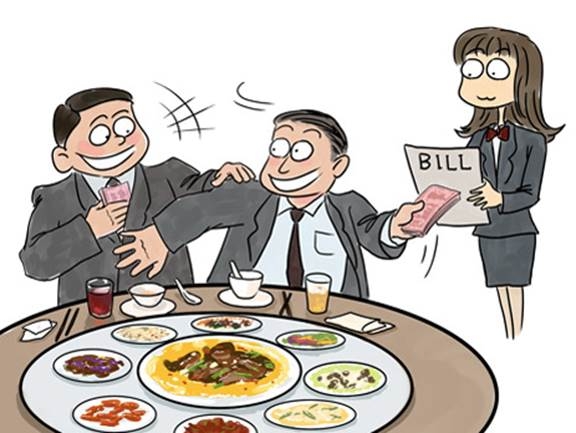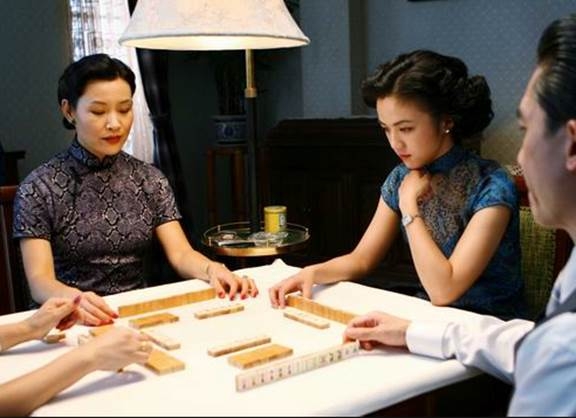Don't miss out on the best jobs!
Subscribe to HelpGoAbroad and weekly we will sent you an email with latest job posts. Provide your email address below
Every country has their own ideas about polite and impolite behavior. Unfortunately, they are not universal. We've all heard of some polite things to do in China such as accepting a business card with two hands or taking your shoes off when entering someone's house. However, beyond the basics, how do you really impress your Chinese counterpart?
1. Give gifts
If you are invited over to someone's home, bring an inexpensive gift. The best gift for any kind of home visit is fresh fruit, such as a bag of tangerines or grapes. If there are kids in the household, some chocolates or sweets are a good option particularly around holidays such as Spring Festival. If you are really trying to impress a male client or perhaps potential father-in-law then bring a carton of imported cigarettes such as Marlboro or China's best cigarette brands such as Zhonghua or others. You could also bring a bottle of wine or baijiu, which is hard liquor with a very high alcohol percentage. Some famous brands are Maotai or Wuliangye. Other top brands can be found here. If you are very good at picking out excellent Chinese tea, then that's also a great gift to bring, but don't just pick any tea randomly. Picking a low quality tea makes you look like an idiot. Remember to keep the gift under 300rmb or so in order to not make the receiver feel obligated to reciprocate (although they probably will someday). China is also cracking down on bribes so if the gift is for a client or co-worker, make sure it's not too expensive.
2. Say no
As a foreigner, you will find yourself as the guest of honor in numerous situations. Always humbly refuse gifts or excessive praise at least three times. If it is a gift and you have tried to refuse three times and it is not too expensive, accept it while praising how amazing the gift is such as, "It's my favorite kind of fruit!!!" If it is praise that is being given, and you have refused to accept it numerous times, start praising the other person such as "I could only have made that sale with your help and hard work!" Be humble, observant and know your place.
3. Make a fool of yourself
Sing the loudest at karaoke (KTV) and dance the most. There are only certain times where one is allowed (and expected) to get loud and let loose in China. KTV is the right place as well as any location where there has been a lot of drinking and your Chinese counterparts are also being loud or laughing.
4. Pay the entire restaurant or coffee bill
Good luck with this one. Even if you can speak the language and know that your friend has already requested the bill, you will still have difficulty being first to pay the bill. The Chinese wait staff are more likely to be convinced to take money from locals than foreigners. However, to give your friends some face, you should let them pay every other time. Splitting the bill equally (called "AA" in Chinese) is a foreign concept; don't do it.
5. Eating etiquette
The seat directly across from the door is for the big boss. The guest of honor will sit to the side of him and the boss's top assistant will sit across from the boss and do the ordering and possibly bill paying. If you would like some more tea, fill up the teacups of those around you first. If you would like to smoke, offer a cigarette to the men around first. If a new dish arrives on the table, spin the dish over to the most important person so they can eat it first. Point the teapot spout over to an empty spot, never at a person. Tap the table in front of your glass whenever anyone fills up your cup for you as a nonverbal way to say "thanks". If it is a home cooked meal, try each dish and make a big deal over your favorites. Never completely finish a dish or else the host will feel bad that they didn't make enough. Eat slowly so that you finish about the same time as everyone else. Keep in mind that you could be at the table for several hours. Eating strange or spicy foods that foreigners don't typically like (everyone knows foreigners only eat sweets and hamburgers) will make you stand out. Eat a lot. Chinese people are not fond of people who are on a diet as food is a very important part of the Chinese culture.
6. Drinking etiquette
In business settings, you will need to drink alcohol and lots of it. If you absolutely can't handle alcohol, immediately make it known up front and quickly find some juice or some other substitute so that you can still toast with those who are drinking. If you can drink your weight in alcohol, you will quickly impress. Usually women aren't as pressured to drink or smoke. When toasting with someone older than you, slightly lower the rim of your cup under the rim of their cup when you click glasses to show respect. Propose a toast to the host or boss or anyone really. Usually after the toast you are expected to empty your shot glass ("gan bei" in Chinese) and show that it is empty to the person you were toasting with. When proposing a toast, say something positive such as "to your future success" or "to good health". Be observant. If people look bored, propose a toast with them (you can do it for everyone or select certain people). If anyone's glass is empty make an effort to fill them immediately. If you are done drinking even your glass of water, leave it full not empty or else it will keep getting filled.
Moving away from alcoholic beverages to tea…
During the daytime, you will be offered tea in tiny little teacups. Don't worry about losing your masculinity as tea parties in China are for even manly men. Drinking fine tea is an art form and knowledge of tea is highly respected. Teacups don't have handles for a reason. If the teacup is too hot to touch, it is too hot to drink. If you are serving tea to your guests have some snacks available as well such as sunflower seeds. Make sure to refill teacups immediately.
7. Share your customs and culture
Throw a party and cook your country's famous dishes (many younger Chinese aren't accustomed to cooking so they will be impressed) or teach your native language. Give your friends some unique gift from your hometown or show them pictures of interesting places you've been to. Expand their worldview and share your expertise and wisdom with them.
8. Learn Chinese, especially idioms
Knowing more than "ni hao" will set you apart from the rest. The Chinese language is full of flowery speech and idioms. If you can master some of them (or learn some good jokes in Chinese), you'll never be forgotten. If you don't know what's being said and don't want to lose face, you can try grunting a strong "mmm" which is a sound of agreement and will lead your counterpart to think that you are completely following what they are saying. But if you hear the word "ma", they have just asked you a question so you'd better find a way to change the subject or apologize for not understanding. The most useful Chinese subject matter to learn? KTV songs.
Enter your text here ...
9. Be a mahjong, kungfu, erhu or taichi expert
Chinese culture is fascinating and there are various types to learn whether it is music, dance, art, poetry or so on. Knowing a little about one or two of them will come in handy. Mahjong is played by old and young. Kungfu is practiced by few but admired by all. If you can play the violin, you will probably be able quickly pick up how to play the erhu and should then learn some famous Chinese tunes. Taichi is practiced by the elderly but since respecting the elderly is a highly admired trait in China, knowing how to do Taichi with them will win you some brownie points.
10. Give face not body
At any possible opportunity, whether it's the cashier at the grocery store or your co-worker, give as much face as possible. Make them look good in front of others or just compliment them. There's no reason to lie and make things up. Simply put on your rose colored glasses on and find the good in everyone and everything including China. Don't talk about how your country is better than China; go ahead and give some face to China! However, keep the focus on the face. You'll want to refrain from bodily contact. Handshakes are fine but a nice smile and nod with a "ni hao" is just as good as a handshake. Hugs are usually not given and even a pat on the back or shoulder might be met with a wince from the receiving party. Keep your affection indoors if needed at all.
Bonus tip! Be connected to Chinese social media. After you first meet someone, they might ask you for your Wechat ("weixin" in Chinese) before you leave. Make sure you download this excellent networking app before going to China. Some people may still use QQ or Weibo but these are being quickly replaced by Wechat as the instant messenger of choice.
Sign in to publish a comment






Be the first to comment on this post.